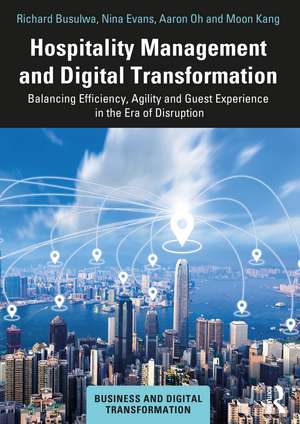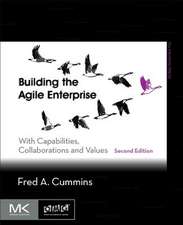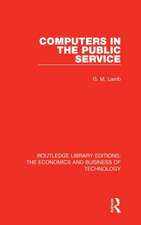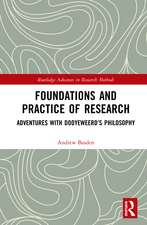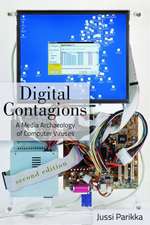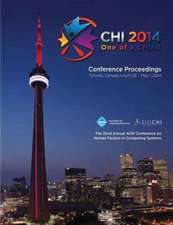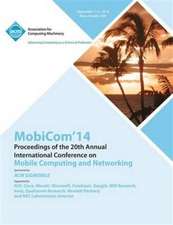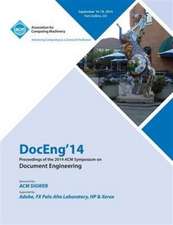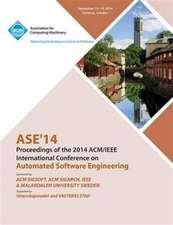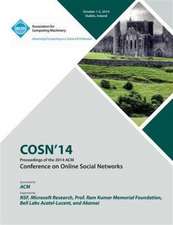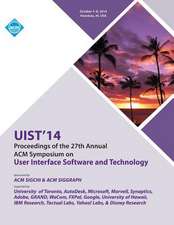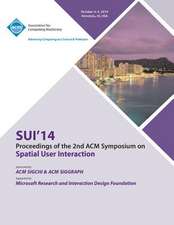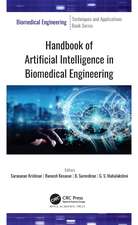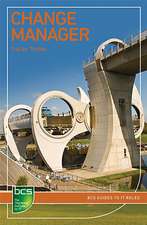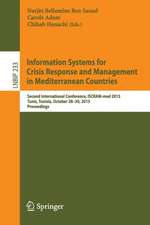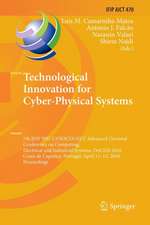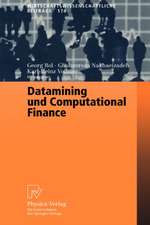Hospitality Management and Digital Transformation: Balancing Efficiency, Agility and Guest Experience in the Era of Disruption: Business and Digital Transformation
Autor Richard Busulwaen Limba Engleză Paperback – 29 dec 2020
Hospitality Management and Digital Transformation is a much-needed guidebook to digital disruption and transformation for current and prospective hospitality and leisure managers. The book:
• Explains digital technology advancements, how they cause disruption, and the implications of this disruption for hospitality and leisure organizations.
• Explains the digital business and digital transformation imperative for hospitality and leisure organizations.
• Discusses the different digital capabilities required to effectively compete as a digital business.
• Discusses the new and/or enhanced roles hospitality and leisure managers need to play in effecting the different digital capabilities, as well as the competencies required to play these roles.
• Discusses how hospitality and leisure managers can keep up with digital technology advancements.
• Unpacks more than 36 key digital technology advancements, discussing what they are, how they work, and how they can be implemented across the hospitality and leisure industry.
This book will be useful for advanced undergraduate and postgraduate students studying strategic management, IT, information systems, or digital business–related courses as part of degrees in hospitality and leisure management; as well as practitioners studying for professional qualifications.
| Toate formatele și edițiile | Preț | Express |
|---|---|---|
| Paperback (1) | 258.63 lei 6-8 săpt. | |
| Taylor & Francis – 29 dec 2020 | 258.63 lei 6-8 săpt. | |
| Hardback (1) | 999.82 lei 6-8 săpt. | |
| Taylor & Francis – 29 dec 2020 | 999.82 lei 6-8 săpt. |
Preț: 258.63 lei
Preț vechi: 323.28 lei
-20% Nou
Puncte Express: 388
Preț estimativ în valută:
49.49€ • 51.67$ • 40.96£
49.49€ • 51.67$ • 40.96£
Carte tipărită la comandă
Livrare economică 04-18 aprilie
Preluare comenzi: 021 569.72.76
Specificații
ISBN-13: 9780367343521
ISBN-10: 0367343525
Pagini: 262
Ilustrații: 7 Tables, black and white; 42 Illustrations, black and white
Dimensiuni: 174 x 246 x 27 mm
Greutate: 1 kg
Ediția:1
Editura: Taylor & Francis
Colecția Routledge
Seria Business and Digital Transformation
Locul publicării:Oxford, United Kingdom
ISBN-10: 0367343525
Pagini: 262
Ilustrații: 7 Tables, black and white; 42 Illustrations, black and white
Dimensiuni: 174 x 246 x 27 mm
Greutate: 1 kg
Ediția:1
Editura: Taylor & Francis
Colecția Routledge
Seria Business and Digital Transformation
Locul publicării:Oxford, United Kingdom
Public țintă
AS/A2, Postgraduate, and ProfessionalCuprins
Part I: Digital Technology Advancements, Digital Disruption, and Digital Business Transformation
1. Introduction and Need for This Book
2. IT, Information Systems, Strategic Information Systems and Digital Technologies
3. Digital Technology Advancements and Digital Disruption: Game Changing Opportunities and Existential Threats
4. Digital Business, the Digital Business Imperative, and Digital Business Transformation
Part II: Digital Disruption and Digital Transformation in the Hospitality and Leisure Industry
5. Digital Disruption and Digital Transformation in the Hospitality and Leisure Industry
6. Impact of Digital Disruption and Digital Transformation on Hospitality and Leisure Managers
Part III: Leveraging Digital Technologies to Thrive in the Digital Era: Roles of Hospitality and Leisure Managers
7. Role of Hospitality and Leisure Managers in Digital Business Strategy, Digital Innovation, Digital Learning, Adaptability and Agility
8. Role of Hospitality and Leisure Managers in Digital Customer Engagement, Digital Stakeholder Engagement, and Digital Customer Experience
9. Role of Hospitality and Leisure Managers in Enterprise Architecture Management, Technology Sourcing, Data Management and Data Analytics
10. Role of Hospitality and Leisure Managers in Cyber Security, Information Privacy, and Digital Ethics
11. Role of Hospitality and Leisure Managers in Digital Leadership, Accelerated Change and Transformation, Digital Risk Management, and Digital Governance
Part IV: Keeping Up with Digital Technology Advancements
12. Keeping up with Digital Technology Advancements
Part V: Digital Technologies Deep Dive
13. Data, Data Management, Data Analytics and Data Science Technologies
14. Internet of Things (IoT) Technologies
15. Artificial Intelligence (AI) Technologies
16. Video Analytics, Computer Vision, and Virtual Reality Technologies
17. Robotics, Drones, 3D and 4D Printing Technologies
18. Network and Connectivity Technologies
19. Blockchain and Other Distributed Ledger Technologies
1. Introduction and Need for This Book
2. IT, Information Systems, Strategic Information Systems and Digital Technologies
3. Digital Technology Advancements and Digital Disruption: Game Changing Opportunities and Existential Threats
4. Digital Business, the Digital Business Imperative, and Digital Business Transformation
Part II: Digital Disruption and Digital Transformation in the Hospitality and Leisure Industry
5. Digital Disruption and Digital Transformation in the Hospitality and Leisure Industry
6. Impact of Digital Disruption and Digital Transformation on Hospitality and Leisure Managers
Part III: Leveraging Digital Technologies to Thrive in the Digital Era: Roles of Hospitality and Leisure Managers
7. Role of Hospitality and Leisure Managers in Digital Business Strategy, Digital Innovation, Digital Learning, Adaptability and Agility
8. Role of Hospitality and Leisure Managers in Digital Customer Engagement, Digital Stakeholder Engagement, and Digital Customer Experience
9. Role of Hospitality and Leisure Managers in Enterprise Architecture Management, Technology Sourcing, Data Management and Data Analytics
10. Role of Hospitality and Leisure Managers in Cyber Security, Information Privacy, and Digital Ethics
11. Role of Hospitality and Leisure Managers in Digital Leadership, Accelerated Change and Transformation, Digital Risk Management, and Digital Governance
Part IV: Keeping Up with Digital Technology Advancements
12. Keeping up with Digital Technology Advancements
Part V: Digital Technologies Deep Dive
13. Data, Data Management, Data Analytics and Data Science Technologies
14. Internet of Things (IoT) Technologies
15. Artificial Intelligence (AI) Technologies
16. Video Analytics, Computer Vision, and Virtual Reality Technologies
17. Robotics, Drones, 3D and 4D Printing Technologies
18. Network and Connectivity Technologies
19. Blockchain and Other Distributed Ledger Technologies
Notă biografică
Richard Busulwa researches and teaches in the Business School at Swinburne University of Technology, home to Australia’s first fully immersed Industry 4.0 facility. His digital business research explores different digital technology advancements, how they drive disruption, and their implications for particular industries, business functions, and professions. He is the author of Strategy Execution and Complexity: Thriving in the Era of Disruption (Routledge) and Start-Up Accelerators: A Field Guide (Wiley). Before entering academia, Richard worked as managing director, COO, CFO, divisional manager, and sales executive in the hospitality, IT, telecommunications, and healthcare industries. He is co-founder of Leapin Digital Keys, the world’s first NBIoT smart lock platform.
Nina Evans is Associate Professor of STEM at the University of South Australia. She also holds a professorial lead position in the STEM academic unit. Nina has had a long career in ICT and STEM education leadership that has included time as vice dean, associate head of teaching and learning, and industry liaison manager. Nina started her career as a chemical engineer and completed undergraduate and postgraduate studies in computer science/IT, education, an MBA and a PhD. Her research and teaching interests are in digital innovation, ICT leadership, information/knowledge management and governance.
Aaron Oh is a professional hotelier, general manager, and hospitality management educator. He has more than 12 years’ experience in operations management and property development of independent and boutique hotels such as the five-star Mayfair Hotel, The Point Brisbane Hotel, and Adabco Boutique Hotel. Aaron teaches hospitality property development, hospitality information systems management, and strategic management at the International College of Hotel Management, the only affiliate school of the Swiss Hotel Association in the Asia Pacific region.
Moon Kang is a hospitality management educator with nearly two decades of experience as a frontline manager, middle manager, senior manager and strategic leader within the hotel industry in the Asia Pacific. This includes stints as food and beverage director with the Shangri-la (Sydney), food and beverage director with the Grand Intercontinental COEX and Grand Intercontinental (Seoul), executive assistant manager with the Sheraton Maldives, and frontline manager and middle manager with Westin Hotels and Resorts. Moon teaches guest experience creation and delivery and food and beverage management at the International College of Hotel Management.
Nina Evans is Associate Professor of STEM at the University of South Australia. She also holds a professorial lead position in the STEM academic unit. Nina has had a long career in ICT and STEM education leadership that has included time as vice dean, associate head of teaching and learning, and industry liaison manager. Nina started her career as a chemical engineer and completed undergraduate and postgraduate studies in computer science/IT, education, an MBA and a PhD. Her research and teaching interests are in digital innovation, ICT leadership, information/knowledge management and governance.
Aaron Oh is a professional hotelier, general manager, and hospitality management educator. He has more than 12 years’ experience in operations management and property development of independent and boutique hotels such as the five-star Mayfair Hotel, The Point Brisbane Hotel, and Adabco Boutique Hotel. Aaron teaches hospitality property development, hospitality information systems management, and strategic management at the International College of Hotel Management, the only affiliate school of the Swiss Hotel Association in the Asia Pacific region.
Moon Kang is a hospitality management educator with nearly two decades of experience as a frontline manager, middle manager, senior manager and strategic leader within the hotel industry in the Asia Pacific. This includes stints as food and beverage director with the Shangri-la (Sydney), food and beverage director with the Grand Intercontinental COEX and Grand Intercontinental (Seoul), executive assistant manager with the Sheraton Maldives, and frontline manager and middle manager with Westin Hotels and Resorts. Moon teaches guest experience creation and delivery and food and beverage management at the International College of Hotel Management.
Recenzii
"Over the last decade, hospitality has been subjected to major disruption from the travel supply chain to the rise of online bookings services. Covid-19 has now brought the digital transformation imperative into sharper focus, forcing hospitality managers to critically reflect on the future of the industry. The authors of this book explain, in plain language, the digital technologies, digital capabilities, and managerial digital competencies required to respond to this imperative. As such, the book provides current and future hospitality managers with a toolkit to effectively play their roles in strategic digital transformation initiatives."
Professor Barry O'Mahony, Chief Academic Officer, École hôtelière de Lausanne Hospitality Management School, Switzerland
"As a general manager in the industry, I like the specific identification of required managerial technology competencies and the simple explanations of how each digital technology actually works"
Justin Kim, General Manager, The Merchant House, luxury hotel in Manama, Bahrain
"From a food and beverage perspective, the digital technologies discussed in this book present considerable opportunities for collating, integrating and using data to identify, understand, predict, and manage food safety risks - as well as public health risks within hospitality settings, as Covid 19 has demonstrated. The understanding of these digital technologies the authors build and the industry implications and use cases they discuss, position managers who understand their power to minimise food safety and public health risks in hospitality products and settings"
Rhett Bertram, Food Safety Inspector, Yarra Ranges Council, Australia
"I was impressed by the breadth and depth of the topics included in the book, I found the discussions about omnichannel experience management, big data (analysis and management), artificial intelligence, and virtual / mixed / augmented reality applications very interesting. One of the great things about the book is that it provides just the right amount of detail to impart meaning and stops before overwhelming the reader. However for a technically minded person like me, the footnotes provided an avenue for more in-depth reading. And, although written for the hospitality industry, the concepts are widely applicable. Also, I really liked the "Discussion Questions", "Google and Reflect", and "Example Tools and Vendors" sections included at the end of chapters to check understanding and stimulate ongoing reflection."
Julio Rivas, □Certified Project Manager and Scrum Master, Baufest technology solutions, USA / Argentina / Chile / Spain
Professor Barry O'Mahony, Chief Academic Officer, École hôtelière de Lausanne Hospitality Management School, Switzerland
"As a general manager in the industry, I like the specific identification of required managerial technology competencies and the simple explanations of how each digital technology actually works"
Justin Kim, General Manager, The Merchant House, luxury hotel in Manama, Bahrain
"From a food and beverage perspective, the digital technologies discussed in this book present considerable opportunities for collating, integrating and using data to identify, understand, predict, and manage food safety risks - as well as public health risks within hospitality settings, as Covid 19 has demonstrated. The understanding of these digital technologies the authors build and the industry implications and use cases they discuss, position managers who understand their power to minimise food safety and public health risks in hospitality products and settings"
Rhett Bertram, Food Safety Inspector, Yarra Ranges Council, Australia
"I was impressed by the breadth and depth of the topics included in the book, I found the discussions about omnichannel experience management, big data (analysis and management), artificial intelligence, and virtual / mixed / augmented reality applications very interesting. One of the great things about the book is that it provides just the right amount of detail to impart meaning and stops before overwhelming the reader. However for a technically minded person like me, the footnotes provided an avenue for more in-depth reading. And, although written for the hospitality industry, the concepts are widely applicable. Also, I really liked the "Discussion Questions", "Google and Reflect", and "Example Tools and Vendors" sections included at the end of chapters to check understanding and stimulate ongoing reflection."
Julio Rivas, □Certified Project Manager and Scrum Master, Baufest technology solutions, USA / Argentina / Chile / Spain
Descriere
Digital advancements are ramping up guest expectations and introducing non-traditional competitors that are disrupting the hospitality and leisure industries. If organisations are to thrive they need to be in a position to effectively leverage digital technologies to improve efficiency, agility and guest experience.
